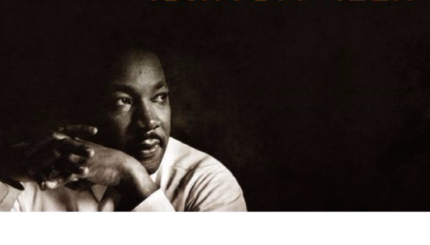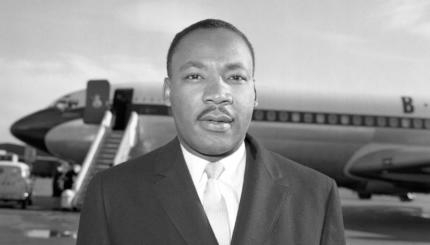Across the country next week, Americans of all faiths and ethnicities will remember and celebrate the legacy of Dr. Martin Luther King, Jr. Be’chol Lashon asked seven African American Jewish leaders, of all ages, backgrounds, religious affiliations, geographic regions and sexual orientations, to share short impressions of what Dr. King’s legacy means to them.
 Dr. Lewis Gordon, an international scholar and teacher, is a professor of Africana philosophy, politics and religion at the University of Connecticut. His roots are in Jamaica and he is a frequent social commentator.
Dr. Lewis Gordon, an international scholar and teacher, is a professor of Africana philosophy, politics and religion at the University of Connecticut. His roots are in Jamaica and he is a frequent social commentator.
Twenty years ago my eldest son and I had a conversation on Martin Luther King, Jr. Day. As I recounted Dr. King’s many great deeds, I mentioned his incarceration in Birmingham where he wrote his famous letter, “Why We Can’t Wait.”
My son was shaken. “Wasn’t Dr. King a good man?” he asked.
“Yes,” I replied.
“Why, then, was he in jail?”
Forced to explain that unjust societies punish people who stand up for what is right, I found myself engaged in one of the great lessons of Torah continued through the ages and illuminated by the courage of Dr. King: the revolutionary idea that ethics is the face of G-d, and dignity demands commitment to that extraordinary responsibility.
 Sandra Lawson, a military veteran and social activist, calls Atlanta home. She is currently a student at the Reconstructionist Rabbinical College.
Sandra Lawson, a military veteran and social activist, calls Atlanta home. She is currently a student at the Reconstructionist Rabbinical College.
I grew up in a pretty typical black family in the 1980’s. We had a picture of King on our wall and my parents had records of a few of his speeches. My parents were not activists. They grew up poor, as sharecroppers in the South, but they instilled in me a black pride that one could hear in the song from James Brown’s “Say it Loud! I’m Black and I’m Proud.” King helped my parents see a better future, not just for me and my brother but for themselves as well.
As a rabbinical student, and a child of southern sharecroppers, I see King as one of the most prophetic voices ever and he reminds me of why I want to be a rabbi which is to help to make the world a better place for all.
 Rabbi Capers Funnye is the Rabbi of Shalom B’nai Zaken Ethiopian Hebrew Congregation in Chicago, Illinois.
Rabbi Capers Funnye is the Rabbi of Shalom B’nai Zaken Ethiopian Hebrew Congregation in Chicago, Illinois.
In 1966 Dr. King came to the Marquette neighborhood where there was vitriolic expressions of hatred as African Americans moved in. Just four blocks from my synagogue was the headquarters of the Nazi Party. Dr. King said, “he had never seen anything so hostile and hateful,” as he did in Chicago. The Rabbi of this shul, Rabbi Schultz, was only 5’3,” but he stood up against the hatred. He let Dr. King know that if there was need to take sanctuary during a planned protest march, Rabbi Schultz would gladly welcome them and provide a safe haven. The violence stopped the march after two blocks. But the circumstance of this synagogue and this rabbi were some of the fantastic elements in the Jewish community that Martin Luther King touched and they reciprocated. I am proud to know men who worked with Dr. King and the representation they gave of Judaism enlivens me every day.
 Dr. Denise Davis lives in the Bay Area where she practices medicine. She is a co-founder of Camp Be’chol Lashon.
Dr. Denise Davis lives in the Bay Area where she practices medicine. She is a co-founder of Camp Be’chol Lashon.
Martin Luther King, Jr.’s birthday is yom tov, a holy day reminding me that a prophetic voice can change the world. It is day of awe, recalling both oppression and courage. As a girl I was barred from enrolling in a segregated ballet school, but King’s transcendent oratories, and the principled commitment of Heschel made a change; these heroes are my heroes. I am an African American Jew. On MLK Day, I celebrate the power of transformation, and the resilience of human dignity. I celebrate a man and a movement close to the Divine.
 Robin Washington is the editor of the Duluth News Tribune in Minnesota. Born in Chicago to a family of African American and Jewish civil rights activists, his journalism and activism are nationally acclaimed.
Robin Washington is the editor of the Duluth News Tribune in Minnesota. Born in Chicago to a family of African American and Jewish civil rights activists, his journalism and activism are nationally acclaimed.
For me, King is an unfinished story; largely because the Civil Rights Movement was over-identified with him to the exclusion of unsung others equally significant. That focus nearly took the movement with him with the widespread belief that it died when he died.
Indeed, no true successor has ever emerged; even President Obama would claim to be more of an inheritor than an architect of social justice.
But I refuse to bury the movement, and maybe that’s King’s legacy: Because he didn’t get there with us, the longing for his Promised Land remains, and his sacrifice demands we strive for it with all our being.
 Lindsey Newman lives and works in New York. She is spearheading and leading Be’chol Lashon’s first Birthright Israel trip.
Lindsey Newman lives and works in New York. She is spearheading and leading Be’chol Lashon’s first Birthright Israel trip.
I most admire Martin Luther King, Jr. as a seeker of justice and a lover of humanity. When King says that “injustice anywhere is a threat to justice everywhere,” I am reminded that I am responsible for the world that I live in, whether I have caused harm or have merely witnessed it. Similarly, when the Torah insists “Justice, Justice You Shall Pursue,” it is this pursuit of justice which is at the core of my identity as a Jew and a human being. King embodied this calling in his life and work, and his legacy is a reminder of this eternal struggle.
 Michael “Kosher Soul” Twitty, is a world-renowned scholar of African American foodways and a Jewish educator living in Washington DC.
Michael “Kosher Soul” Twitty, is a world-renowned scholar of African American foodways and a Jewish educator living in Washington DC.
The most stunning moment of the Civil Rights era to me was Rabbi Abraham Joshua Heschel marching with Dr. King in Alabama. That iconic image and conversation is part of my spiritual genealogy, they are my ideological ancestors. Their souls were the parchment, the electrifying oratory and moral suasion their ink, their living Torah was a new covenant with the American dream, without which my dreams would be impossible.
Torah
Pronunced: TORE-uh, Origin: Hebrew, the Five Books of Moses.



